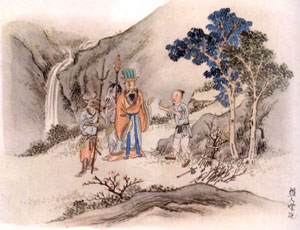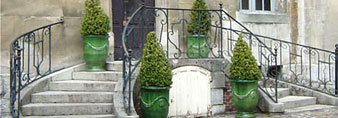THE THIEVES AND ASS (I, 13)
Two thieves who stole an ass a-fighting fell
Whether to keep the animal or sell.
While blows went trotting brisk from pate to pate,
To know who should decide the creature's fate,
Another thief arrived, got on his back,
And galloped off with Master Jack.*
The ass is sometimes but a spot of ground,
The thieves in such and such a prince are found ;
Instead of two I now quote three,
From Turkey, Austria, and Hungary,
The goods in contest are most common sights ;
Yet oft the victors can't their conquests guard,
A fourth thief comes and sets them all to rights,
And gallops off the ass for his reward |
SIMONIDES PRESERVED BY THE GODS. (I, 14)
Three characters distinct our incense claim,
The gods, our mistress, and the king ;
Malherbe says so ; and I subscribe my name
To maxims from which good may spring :
Praise charms the ear, and brings us friends for fame ;
Sometimes it gains the favours of the fair ;
Sometimes the gods reward it with their care.
Simonides one day had undertook
A certain athlete's eulogy,
But in his hero found a subject dry,
And barren matter for a book.
The athlete's family had no renown --
His sire a sober citizen unknown--
The bard must find materials of his own.
At first the haro of his pen he sang,
And when no more of him he had to say,
Digressed, and to the skies arose ;
And now in bolder note and louder lay,
Castor and Pollux's brilliant praises rang,
Their wondrous deeds he shows,
The places where they glory bought ;
Displays their struggles for the prize,
The glorious battles that they fought,
And bears the twins triumphant to the skies.
The wrestler's deeds were in the proëm,
The gods filled more than half the poem.
The athlete had agreed his price to pay,
But when lie saw his deeds so sparsely sung,
Gave but a third, and with a sneer did say ;
“ Let Castor and his brother give the rest,
The twins, I hope, won't think it wrong ;
To-night, however, will you be my guest ?
I give a banquet to some chosen friends,
Come sup with us and let this make amends.”
Simonides said Yes. Perhaps, men say,
He feared te lose his praise as well as pay.
He went, and there was revel and good cheer,
And all in happy humour now appear.
When suddenly a slave says in his ear,
Two -men desire to speak with him without ;
He leaves the hall filled with the munching rout.
The two men were the poem's subjects ; gravely
They thanked him for the praises given in it,
And bid him foot it bravely ;
Since all the house would topple in a minute.
This prophecy,
Was not a lie.
A pillar cracked, the ceiling fell
On plates and cups : confusedly
Guests, waiters tumbled all pell-mell.
Nay more, to make completer seem
The vengeance of the bard, a beam
Broke both the athlete's legs, and mauled
Sadly the rest to that feast called.
The miracle soon spread around,
The poet’s rights, the wrestler's wrongs,
Which raised the price of flattering songs,
And brought the poet many a pound :
For every mother's son, however sprung,
Now had his ancestors most highly sung ;
Nor grudged to give a handsome prize
To such a favourite of the skies. |
|
|
I’ll to my text again, and first I say,
Praise God and kindred in poetic lay,
Melpomene has honourable gains,
And gets reward for trafficking her brains.
Then let our art meet no unjust refuses,
The great are honoured who reward the muses.
Of old, Olympus with Parnassus joined,
As friendly brothers of the mountain kind.
DEATH AND THE WRETCH (I, 15)
A wretch, who in misfortunes pined,
Daily invoked the aid of Death :
“ Come quick,” he said, “I yield my breath ;
Come, lovely Death ! and ease my mind.”
The monarch dire to please him came,
Knocked at the door, announced his name ;
Entered the room and near him drew.—
“ What,” cried he, trembling, “ do I view !
Hence, hideous object, from my sight !
I shake with horror and affright !
O Death, keep off ! Away ! ill-omened wight !”
Mecaenas somewhere thus exclaimed,
Let fate all vigour from my body take,
Let me be gouty, handless, maimed,
Let fate a moving trunk my body make ;
More than content do I the bargain strike,
Never to die.—Many have said the like.
|
DEATH AND THE WOODMAN (I,16)
A woodman poor, and sunk in years and woes,
Groaned with the load his weary hands had cut.
Bowed down beneath Time's many-handed blows,
With painful steps he sought his smoky hut.
At last lie could no farther go—
Laid down his load, reflected on his woe ;
What earthly pleasure had he ever found !
Lived there a poorer wretch this world around !
Often no bread—through wakeful nights oppressed ;
Wife, children, soldiers, taxes, and the rest.
What gloomier picture could his fancy draw ?
He called on Death, and soon the monarch saw.
“What do you want ? ” he asked, as near he strode.
“Please,” said the man, “ help me to raise my load.”
Death comes, a cure for every cry ;
Yet we recoil and doubt his skill,
And trembling hold our motto still,
Rather to suffer than to die.
|

Death and the woodman (China ill. ) |
|



